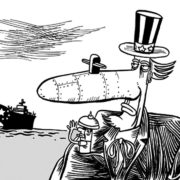ACCORDING to reports, President Benigno S. Aquino III’s second year in office will be met with “little fanfare.”
Deputy presidential spokesperson Abigail Valte said that unlike last year, when PNoy had a town-hall meeting to discuss his accomplishments so far, there were no scheduled activities for the Chief Executive’s second year.
However, Malacañang has released excerpts of Ruchir Sharma’s book, Breakout Nations: In Pursuit of Next Economic Miracles, where Sharma wrote: “at long last the Philippines is on the road to becoming part of the elite group of tiger economies,” under PNoy’s watch as president.
“Now at long last, the Philippines looks poised to resume a period of strong growth. The president, Benigno ‘Noynoy’ Aquino III, probably has enough support, and looks likely to generate just enough reform momentum, to get the job done. The Aquino name is still virtually synonymous with the promise of change,” Sharma said.
According to Sharma, PNoy was once perceived in foreign circles as “an unimpressive 51-year-old bachelor who had lived most of his life with his mother and had not made much of a mark in a low-profile career as a Philippine senator,” as reported by Philstar.com.
“However, Filipinos saw him as an honest figure who could deliver on the Aquino mandate for change and they were desperate after nine years of drift and decay under outgoing president Gloria Macapagal-Arroyo,” Sharma further said, adding that PNoy’s presidential victory was the product of public sympathy, due to his mother’s death in 2009.
“His victory margin was unprecedented and his task daunting at a time when it seemed like the whole country was in disrepair,” Sharma said.
Foreign media also gave their share of compliments to the Aquino administration.
Wall Street Journal said: “The Philippines is better prepared than in the past to withstand a downturn with a stronger government balance sheet and a robust domestic economy. Foreign reserves are high enough to fight capital flight.”
The latest survey conducted by Social Weather Stations (SWS), conducted from May 24-27, showed that 51 percent of respondents (about 10.3 million households) rated themselves as “poor.” (In March, the poll revealed 55 percent or around 11.1 million families).
The poll also revealed that 39 percent of Filipinos (about 7.9 million families) say that they are “food poor,” which is lower by six points from last year’s 45 percent (9.1 million families).
According to SWS, self-rated poverty and food poverty had slight improvements in all areas. However, it also “noted that families continue to tighten their belts.”
Meanwhile, others seem to have a different view.
New York-based Human Rights Watch (HRW) asserts that after two years in office, PNoy still has not addressed the need to bring those accountable for extrajudicial killings or enforced disappearance — including those that happened under his watch.
HRW released a video, “Philippines: No Justice for Victims of Enforced Disappearances,” where family members of those who “disappeared” called on the President to live up to his promises of justice.
Elaine Pearson, HRW Deputy Asia Director, said: “President Aquino has not lived up to his promises to bring those responsible for serious abuses to justice. Concrete measures – rather than more promises – are needed now.”
Labor activist group Kilusang Mayo Uno claims that PNoy made conditions worse for workers and the poor.
“Workers’ wages are more depressed than before, contractual employment is more rampant, and joblessness is more widespread. Workers do not have anything to celebrate after Aquino’s two years in power,” said KMU Chairman Elmer Labog.
And of course, there’s the recent public contention over the $1-billion loan committed to the International Monetary Fund by the Aquino government, without Congress’ approval. The minority bloc of the House of Representatives has not raised any objections to the move. Even the usually feisty Senator Miriam Defensor-Santiago defended PNoy’s action.
“At present, there is no such law that requires the President to consult Congress or the Senate. If the Senate wishes to participate in the foreign loan process, then it should pass a bill to that effect,” Santiago said.
“Is the loan constitutional, since it was granted without congressional participation? Answer: Under the Constitution, there is no legal obstacle to the loan,” she added.
“Questions of wisdom in foreign policy should be addressed to President Aquino when, as the country’s lone spokesperson in foreign affairs, he is privy to confidential information that is not available to Congress. The Constitution provides that the President may contract foreign loans on behalf of our republic,” Santiago further stated.
While the recent Pulse Asia survey showed Aquino’s dwindling popularity among his “bosses,” the truth of the matter is that only an informed few fully understand the economic and socio-political implications of the decisions being made by the president.
Like any presidential term, ups and downs, compliments and protests, should be expected along the way. The extent of criticism or praise is always dependent on comparisons made between present and past governments.
What we should constantly exercise is our freedom to voice out, not just views based on popular public opinion, but informed, educated and intelligent evaluations, for the common good.
(AJPress)







